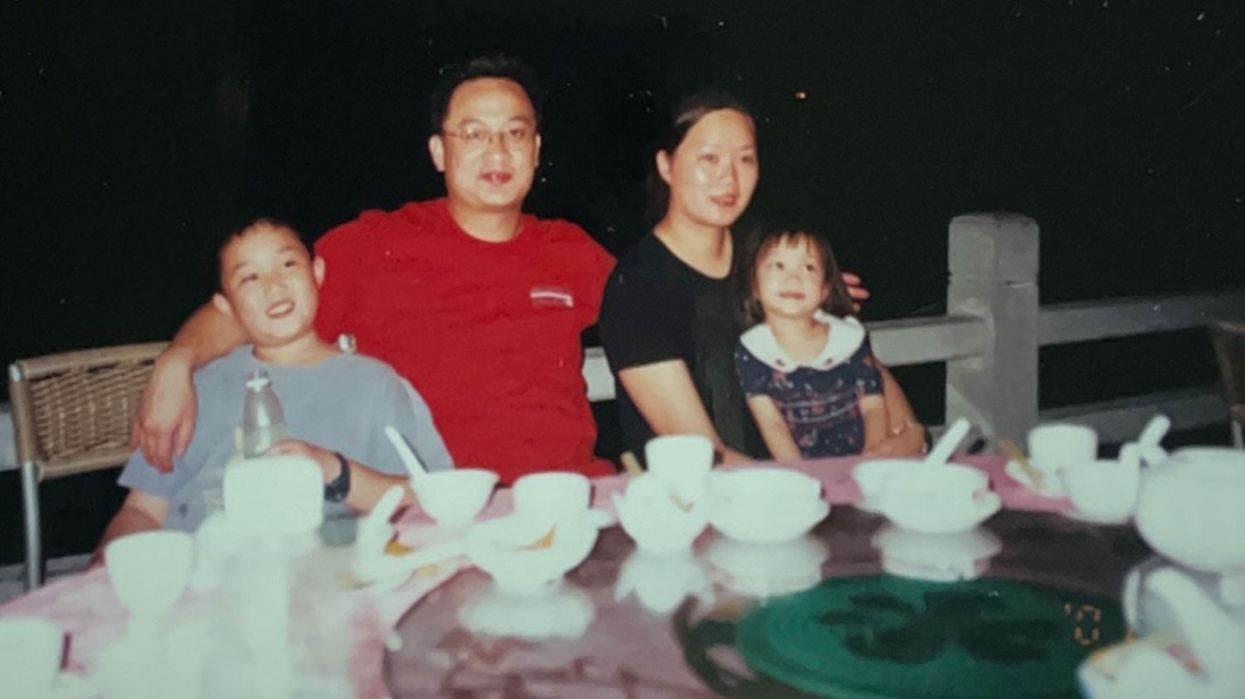IYKYK, Food is How We Say I Love You
For many first-generation Asian American families, sometimes saying "I love you" is a bowl of fresh summer fruit.

Growing up in Brooklyn, I was primarily raised by my grandparents as my parents were working full-time and often late hours. With my limited Cantonese and my grandparents speaking little to no English, dialogue between us was sometimes strained. Although I didn’t often hear the phrase “I love you,” I knew very well that I was loved because we shared a timeless, universal language: food.
The phrase “I love you” was something I associated with saccharine romantic dramas or reruns of soap operas on Channel 4. Knowing many other first-generation Asian American families, I would venture to say they would agree. Familial love, in my household, was prominent not through words or physical touch, but through acts of service, and that was most often translated into food. These shared meals were not only delicious, but also nutrients packed, and always served with a piping hot bowl of white rice and soup that was simmering all day.
My parents and grandparents came from big families in China during the '70s where food and grain rationing was the norm. As growing teens in their respective family of five, enjoying food was a luxury. That experience was completely different from mine, and that was their goal. People forget that war and cultural reforms were extremely prominent in so many parts of Asia for our boomer parents, and that plays heavily into the unspoken generational language around sharing food. I remember my dad telling a story where they had to split a single siu-mai into four pieces while I was devouring one whole (talk about great timing).
A bowl of freshly cut fruit might just be refreshing and a kind gesture to many, but to me, that translates to an “I LOVE YOU” (caps intended). In an Asian household, the quintessential form of love, especially as a kid, is having a bowl placed by your side as you power through your homework from school and extra tutoring. From bunny-shaped apple slices to perfectly-cored pears to peeled grapes to my favorite tropical fruits, it was a labor of love.
The first time I really connected love and emotion to a bowl of fruit was when I was eight. It was a hot, humid summer in Brooklyn and, just our luck, the power was cut leaving everyone to fend for themselves without air conditioning. In retrospect, I blame the heat, but I got in a huge fight with my maa-maa (grandma in Cantonese) and said words no eight-year-old should say—Cantonese I didn’t know I knew flew right out of me. I don’t remember the fight but I knew it was big. Between the heat and the wounded pride of an eight-year-old, I had no intention of apologizing. I was left to wallow for what felt like the longest 20 minutes of my life, preparing for round two when I heard the door open. Suddenly, placed next to me was a bowl of quartered, peeled grapes without a single seed in sight. All maa-maa said was, “Eat—the grapes are sweet,” before closing the door behind her. Anyone looking at this situation could easily just call me a brat, but at that moment, that bowl of grapes was saying, “I forgive you, and I love you.” (I know I was being a brat.)
Usually, the first question asked when I get home is, “Did you eat yet?” If I ever answer yes, I need to be prepared to fully describe everything that was on the table, small bites and entrees alike. There will be a judgment on the lack of vegetables because apparently there’s never enough. If I answer no, it could go one or two ways: my mom rushes into the kitchen to prepare a quick yet nutritious noodle soup or she lists all thirty-seven items in the fridge for me to use to make a meal. And I know for a fact that I’m not the only one that hears this–the question pop’s up in Netflix’s BEEF and in multiple WongFu shorts; it’s a common question and the subtext is always, “I love you.”
I've been told that I have similar habits to my ye-ye (grandpa in Cantonese), perhaps as a result of me spending most of my childhood with him. While I don’t have many memories of elementary school, I do remember the internal dilemma ye-ye created when he asked me what I wanted to eat. With a world of food choices at home, nothing felt quite as good as grabbing a cheese slice from our corner pizzeria. While ordering, he'd point at it and utter a stern, “Cut two" (he knew I couldn’t finish it on my own). So many aspects of a Chinese dinner point to sharing—the giant lazy susan at the table's center, the long chopsticks we use to reach over each other, splitting a cheese slice with my ye-ye—dinners are meant to be eaten family-style.
By far, my favorite memory was getting Sunday dimsum. Like many other families, there were courtesies; being hangry was out of the question. Traditionally, the elders were served first and the food made its way down to me after. Dimsum serving sizes are small, about three to four bite-sized pieces per dish, so by the time the dishes got to me, everything I wanted to eat was gone. I was so upset, but as table manners reigned supreme, I couldn't show it. Thankfully, ye-ye noticed my pout and ever since then, he'd pick a few extra pieces first onto his plate, divvy them up, and place them onto my plate–discreetly of course.
It may be a long time before saying “I love you” comes naturally to me. The closest I got was texting ILY to my closest circle of friends, but I don’t plan to quietly show my affections forever. Should I ever say those three words, I want them to come from the heart. For now, my love comes in the form of perfectly cut mangoes and sweet pineapples–cored of course.




